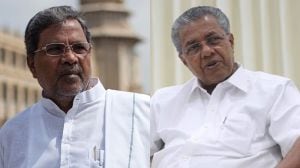The bus to Pakistan
We seem to be about to get a bus to Pakistan. Better, of course, than another Train to Pakistan. But not much more. With the eyes of the wor...

We seem to be about to get a bus to Pakistan. Better, of course, than another Train to Pakistan. But not much more. With the eyes of the world trained on us, we have confirmed, to ourselves as much as to interested third parties, that our secretaries can bowl maiden overs at each other, but seem incapable of scoring any runs. We now have to wait till February, and a possible change of government in between, for a return to the negotiating table.
The dialogue, as it is presently structured, has little hope of succeeding. There are three major flaws: the level of dialogue; its sectoral compartmentalisation; and the stop-start technique of the negotiating process.
First, the level of dialogue. Civil servants, however able, have to work to a brief. They do not have the authority, or training, to bring imagination to the negotiating table. It is an achievement for them to say they did not let the other side move forward. They run the risk of being called to task if they open new vistas. Yes, the factthat the dialogue has started and the entire gamut of issues has been addressed is, in itself, significant.
Each side has been exposed to the concerns of the other. And there has been a blunt statement of limitations by both sides. That establishes the parameters of what is possible. But availing of those possibilities is a political responsibility. That is why the dialogue must forthwith be raised to the political level if it is to have any hope of success.
If the dialogue remains stuck in a civil service rut, this is perhaps related to the second flaw: the compartmentalisation of the dialogue. Negotiators on both sides change with every change of topic. Each negotiator is then obliged to prove himself as adamant as his peers. The foreign secretaries are brought in to resolve the impasse only after the dialogue has first been mired in an impasse. Clearly, we cannot have a panoply of ministers dialoguing on different subjects. But we can have a single political negotiator on either side carrying forwardthe dialogue, while their aides change with the change in subject.
It is this that will give coherence to the process. Most importantly, it will open the scope for inter-sectoral trade-offs. So long as the dialogue remains compartmentalised, no gain on Tulbul/Wullar, for example, can be matched by movement forward for the other side on, say, Siachen/Saltoro. The whole point of comprehensively addressing the entire range of issues is lost if the discussion over them is fractured. There is, however, no alternative to such structural fracturing if the dialogue is conducted by civil servants. For all secretaries are equal even if foreign secretaries like to think they are more equal than the others. A comprehensive but single-point dialogue is possible only if the negotiators are political.
The third flaw in the structuring of the dialogue is intermittance. There are long gaps between bouts of dialogue. At best, the next round is scheduled. At worst, both periodicity and venue are uncertain. In the absenceof definitive timing and phasing, time and venue themselves become weapons in the armoury of diplomacy to stall talks for reasons of tactical expediency even if this is to the detriment of larger strategic goals.
If the fixing of a meeting itself becomes a major diplomatic task, as it has been since the process started, both sides spend more of their energy talking about talks than talking. This can be obviated if periodicity is pre-determined and venue does not become an excuse for derailing the dialogue.
Gaps extending over months need to be whittled down to the shortest period possible. To the extent that such routine is brought into the very framework of the dialogue, it would be possible to rescue the discussion from the passing passions of day-to-day developments in India-Pakistan relations.
Those day-to-day developments had best been handled through normal diplomatic channels while fundamental challenges are addressed through the structured dialogue. At present, basic issues of long-term impactare being held hostage to the inevitable ups-and-downs of a subcontinent in upheaval.
If fixed and frequent periodicity is one component of sustained dialogue, the other is the vexed question of venue. My favoured solution is to take a leaf out of Panmunjom and schedule the talks permanently over the border in the no-man8217;s land between Wagah and Attari. Wagah is an hour8217;s drive from Lahore, Attari even less from Amritsar. The two sides could meet without leaving their respective countries, thus taking the question of venue out of the realms of unilateral diplomatic 8220;convenience8221;.
Such a venue would also have the inestimable advantage of limiting grandstanding before the media. An intermittent dialogue is splendid for photo-opportunities and soundbites. It is these that sometimes come in the way of give-and-take. I am not suggesting that the talks be secret or screened from the media, but that the routinising of the venue, as much as of the timing, will allow for less pressure on the negotiators torepeatedly prove that they have given nothing away.
India-Pakistan relations are sufficiently central to the foreign policies and security concerns of both countries to suggest that foreign ministers themselves be placed in charge of such a dialogue. Certainly, I.K. Gujral and Sartaj Aziz might have made for such a sweetheart combination. But the very fact of frequency, and the imperative of sustaining the dialogue indefinitely, perhaps make foreign ministers the wrong authority to prepare the ground for final Cabinet endorsement. Ministers of State for India-Pakistan affairs might be a solution. Or, possibly, special envoys like D.P. Dhar or G. Parthasarathi in the past.
The bus to Pakistan will not move on self-start ignition. It will need assiduous cranking to get it going. And if we don8217;t get it going, there are others raring to jump into the driver8217;s seat. Clinton has saved his presidency by pulling-off the Wye River resort Israel-Palestine accord a week before America went to the polls. The accordmight have done little or nothing to advance the cause of peace in Palestine but it has certainly helped slash the Republican majority in Co-ngress and thus take the steam out of impeachment proceedings. The temptation to assure a similar mediating role in South Asia could prove irresistible if our bus does not soon start trundling out towards Pakistan.
- 01
- 02
- 03
- 04
- 05































